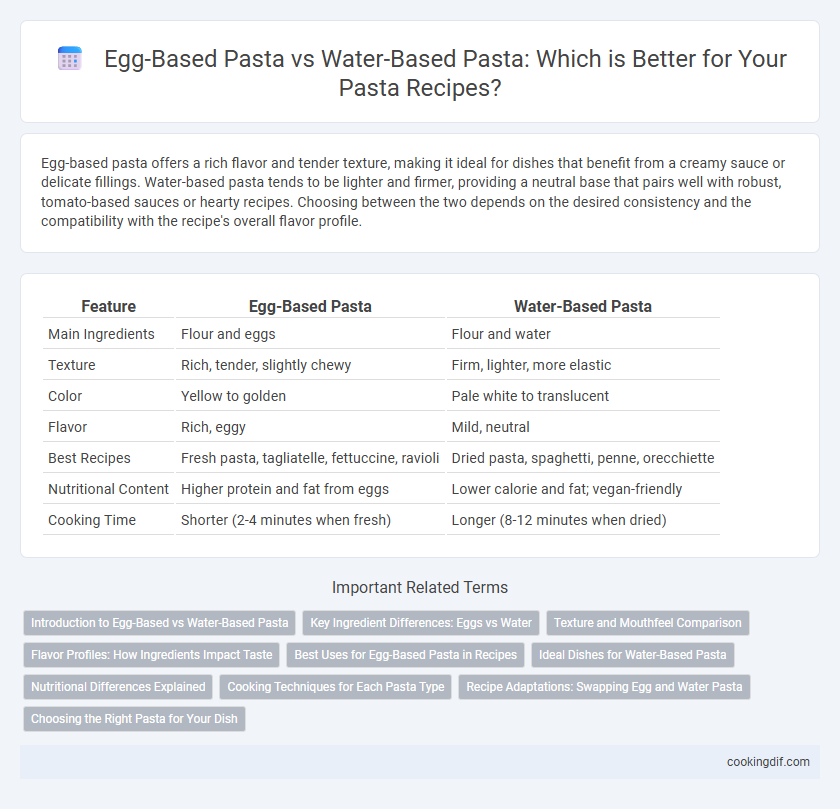Egg-based pasta offers a rich flavor and tender texture, making it ideal for dishes that benefit from a creamy sauce or delicate fillings. Water-based pasta tends to be lighter and firmer, providing a neutral base that pairs well with robust, tomato-based sauces or hearty recipes. Choosing between the two depends on the desired consistency and the compatibility with the recipe's overall flavor profile.
Table of Comparison
| Feature | Egg-Based Pasta | Water-Based Pasta |
|---|---|---|
| Main Ingredients | Flour and eggs | Flour and water |
| Texture | Rich, tender, slightly chewy | Firm, lighter, more elastic |
| Color | Yellow to golden | Pale white to translucent |
| Flavor | Rich, eggy | Mild, neutral |
| Best Recipes | Fresh pasta, tagliatelle, fettuccine, ravioli | Dried pasta, spaghetti, penne, orecchiette |
| Nutritional Content | Higher protein and fat from eggs | Lower calorie and fat; vegan-friendly |
| Cooking Time | Shorter (2-4 minutes when fresh) | Longer (8-12 minutes when dried) |
Introduction to Egg-Based vs Water-Based Pasta
Egg-based pasta features a rich texture and golden hue due to the inclusion of whole eggs, often preferred in traditional Italian dishes like tagliatelle and fettuccine. Water-based pasta, typically made from just flour and water, offers a lighter, more neutral base ideal for capturing bold sauces, commonly used in varieties like orecchiette and cavatelli. The choice between egg-based and water-based pasta significantly impacts the dough's elasticity, cooking time, and flavor profile in recipes.
Key Ingredient Differences: Eggs vs Water
Egg-based pasta contains enriched protein and fat from eggs, providing a richer flavor and firmer texture ideal for recipes requiring a robust bite. Water-based pasta relies on water as the primary liquid, resulting in a lighter, more delicate dough that absorbs sauces effectively. The key ingredient difference influences dough elasticity, cooking time, and pairing with sauces, making egg pasta preferable for hearty dishes and water pasta better suited for lighter preparations.
Texture and Mouthfeel Comparison
Egg-based pasta offers a richer, silkier texture with a tender bite due to the higher protein and fat content from eggs, enhancing mouthfeel and providing a more luxurious eating experience. Water-based pasta has a firmer, chewier texture, making it ideal for dishes where a robust bite is desired, such as in hearty sauces or baked pasta recipes. Egg pasta tends to absorb sauces more smoothly, while water-based pasta maintains structural integrity under prolonged cooking.
Flavor Profiles: How Ingredients Impact Taste
Egg-based pasta delivers a richer, more savory flavor due to the natural fats and proteins in eggs, enhancing dishes like carbonara and fettuccine Alfredo. Water-based pasta offers a lighter, more neutral taste that allows bold sauces such as marinara or pesto to shine without competing with the pasta's flavor. Choosing between egg-based and water-based pasta depends on the desired balance of flavor intensity and texture in the final dish.
Best Uses for Egg-Based Pasta in Recipes
Egg-based pasta offers a rich flavor and tender texture, making it ideal for dishes like fresh fettuccine, tagliatelle, and stuffed pastas such as ravioli or tortellini. The higher protein content provides elasticity and a smooth surface that holds creamy sauces and delicate fillings effectively. Egg pasta's robustness pairs well with hearty sauces, including Alfredo, carbonara, and meat ragu, enhancing traditional Italian recipes.
Ideal Dishes for Water-Based Pasta
Water-based pasta is ideal for light, broth-based dishes like minestrone and seafood soups, where the subtle flavor of the pasta complements rather than overpowers the other ingredients. Its firm texture holds up well in baked pasta recipes such as lasagna and pasta al forno, absorbing sauces without becoming mushy. This type of pasta works best with delicate sauces, including fresh tomato or herb-infused olive oil, enhancing the overall harmony of the dish.
Nutritional Differences Explained
Egg-based pasta contains higher protein and fat content due to the inclusion of whole eggs, enriching its nutritional profile with essential amino acids and vitamins like B12 and riboflavin. Water-based pasta, being primarily composed of flour and water, offers a lower-calorie option with reduced fat but also fewer nutrients and less protein. Both types provide carbohydrates as a primary energy source, but egg-based pasta supports muscle repair and sustained energy more effectively due to its enhanced nutrient density.
Cooking Techniques for Each Pasta Type
Egg-based pasta requires gentle cooking in boiling water for 2 to 4 minutes, ensuring a tender texture while maintaining its rich flavor, and is ideal for delicate sauces. Water-based pasta, commonly used for dried varieties, demands a longer boiling time of 8 to 12 minutes and benefits from vigorous stirring to prevent sticking and achieve al dente firmness. Adjusting cooking time and water temperature is essential for each pasta type to optimize texture and flavor absorption in recipes.
Recipe Adaptations: Swapping Egg and Water Pasta
Swapping egg-based pasta with water-based pasta in recipes requires adjusting cooking times and sauce pairings due to differences in texture and absorbency. Egg pasta typically has a richer flavor and firmer bite, enhancing dishes like carbonara or fettucine Alfredo, while water-based pasta offers a lighter, more neutral base suited for delicate sauces or vegetable-forward recipes. Recipe adaptations often involve modifying liquid ratios and cooking durations to maintain optimal pasta consistency and flavor balance.
Choosing the Right Pasta for Your Dish
Egg-based pasta offers a richer flavor and firmer texture, making it ideal for hearty dishes like lasagna or carbonara that require a robust pasta to hold up against thick sauces. Water-based pasta provides a lighter taste and more delicate texture, better suited for light, fresh sauces or seafood recipes where the pasta should not overpower the ingredients. Selecting between egg-based and water-based pasta depends on the dish's sauce thickness, cooking method, and desired texture to achieve optimal flavor harmony.
Egg-based pasta vs water-based pasta for recipe Infographic

 cookingdif.com
cookingdif.com